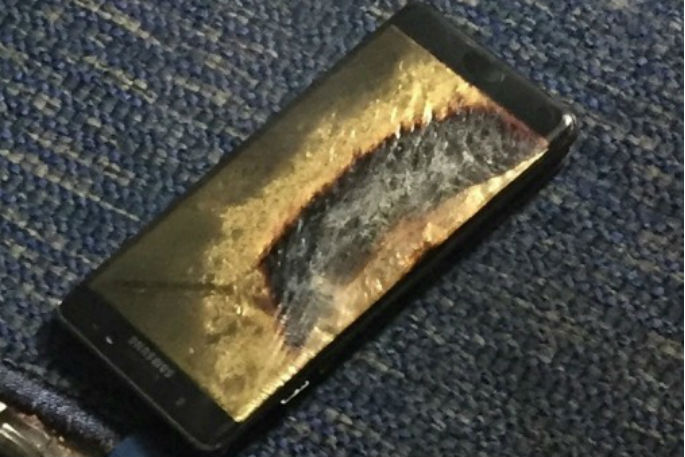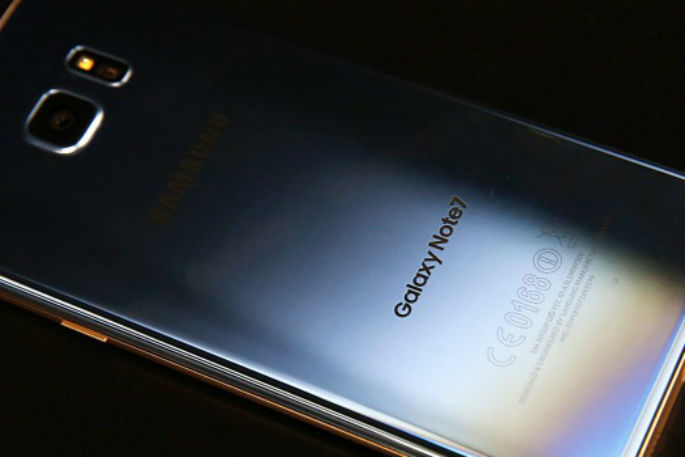Air New Zealand is issuing a total ban on fire-prone Samsung Galaxy Note 7 smartphones on all of its flights from 5am today, Sunday.
The airline strongly advises travellers not to bring the devices to the airport with them, says an airline spokeswoman.
"They cannot be accepted for travel and there is no storage facility available for them at our check in areas," the spokeswoman said on Stuff.
Spark has notified customers of the first reported case of a Samsung Galaxy Note7 exploding in New Zealand.
The Air New Zealand ban takes effect the same time as the US ban. The United States Department of Transportation issued a total ban on passengers and flight crews bringing the phones on airline flights into and out of the United States.
"Air New Zealand apologises to customers for any inconvenience, however, this is an FAA and US DOT safety requirement."
The Civil Aviation Authority this week told airlines they had to ensure passengers turn off any Samsung Galaxy Note 7 devices when travelling, but fell short of an outright ban.
 This smartphone began smoking inside a Southwest Airlines plane on October 5, 2016. Photo: Supplied.
This smartphone began smoking inside a Southwest Airlines plane on October 5, 2016. Photo: Supplied.
The US order, which went into effect at 5am today New Zealand time, says the phones may not be carried on board or packed in checked bags on flights to and from the United States or within the country.
The phones also can't be shipped as air cargo. Passengers caught attempting to travel with the phones will have the phones confiscated and may face fines, the department said.
Samsung has recalled more than 2.5 million of the smartphones worldwide, citing a battery manufacturing error, and discontinued the product earlier this week, less than two months after its August release.
In New Zealand, Samsung Galaxy Note 7 buyers will be given $100 compensation – on top of a cash or credit refund – to compensate them for the "stress" and inconvenience of having to return the smartphones.
New Zealand Post has told consumers not to post or courier Samsung Galaxy Note 7 smartphones back to retailers because of the safety risk.
Instead it is telling buyers to return the smartphones to retailers in person.
The US Consumer Product Safety Commission says there have been nearly 100 reports of batteries in Note 7 phones overheating in the U.S.
One fire erupted on a Southwest Airlines flight earlier this month. In another case, a family in St. Petersburg, Florida, reported a Galaxy Note 7 phone left charging in their Jeep caught fire, destroying the vehicle.
The Federal Aviation Administration had previously warned passengers not to pack the phones in their checked bags and to power them off and not charge them while on board planes.
"We recognise that banning these phones from airlines will inconvenience some passengers, but the safety of all those aboard an aircraft must take priority," said Transportation Secretary Anthony Foxx.
"We are taking this additional step because even one fire incident inflight poses a high risk of severe personal injury and puts many lives at risk."
The Note 7 isn't the only gadget to catch fire thanks to lithium-battery problems, which have afflicted everything from laptops to Tesla cars to Boeing's 787 jetliner.
At least three U.S. airlines are adding new fire-suppression equipment to fleets in case a cellphone or laptop battery overheats, catches on fire and can't be extinguished.
Rechargeable lithium batteries are more susceptible to overheating than other types of batteries if they are exposed to high temperatures, are damaged or have manufacturing flaws.
Once overheating starts, it can lead to "thermal runaway" in which temperatures continue escalating to very high levels. Water can extinguish the flames, but doesn't always halt the thermal runaway.
Flames will often reappear after initially being quenched. Lithium batteries are ubiquitous in consumer electronic devices.
Manufacturers like them because they weigh less and pack considerably more energy into the same space than other types of batteries.
Earlier this year, the International Civil Aviation Organisation, a U.N. agency that sets global aviation safety standards, banned bulk shipments of rechargeable lithium-ion batteries as cargo on passenger planes until better packaging can be developed to prevent a fire from spreading and potentially destroying the plane.

No more flying for the Note 7. Photo: Supplied.



0 comments
Leave a Comment
You must be logged in to make a comment.